Customer experience has taken center stage in SaaS. Product quality and pricing still matter, but they no longer drive decisions the way they once did. For the third year in a row, research ranks customer experience above both product and price. At the same time, the definition of “great CX” keeps climbing—often faster than customer-facing teams can match.
AI offers one way to bridge that gap.
McKinsey reports an average return of 250%—about $3.50 for every $1 invested—when companies use AI effectively. The key is knowing exactly where it can make the biggest difference, whether that’s improving customer conversations, streamlining operations, or enhancing the product itself.
We asked CX experts how they’re using AI, how automation supports their teams, and what’s changed in their results since adopting it. We also mention where and how to look for the most fitting candidates for AI automation.
Where should you actually start with AI?
Unlike what it may seem when you peruse your competitors’ sites or LinkedIn, not every part of the customer journey needs AI from day one. CX teams can (and should!) start by identifying a single area where it could make the biggest difference, rather than try to cover multiple processes at once.
The good news is that, unlike even a few years ago, you don’t have to build AI solutions in-house. Many modern tools, especially SaaS solutions, are quick to implement.
As a general rule, companies can see the fastest CX-related results by focusing on tasks that are repetitive, time-consuming, or prone to errors. These include analyzing customer feedback, automating routine support, or personalizing quotes.
On that note, even if you implement AI for a specific area like answering FAQs, it doesn’t mean it must be 100% automated. Some of the most effective use cases are a mix of AI-human work. Here are several examples from our team and CX leaders that you can use for inspiration.
Real AI success stories in customer experience
Here are some real-life success stories we gathered that you can use as an inspiration to implement AI to improve your customer experience.
AI-powered information retrieval for agents
The volume of support ticket is rising, yet, 82% of customers expect issues to be resolved immediately, according to HubSpot. AI helps to close this gap by allowing human agents to get access to the right information faster.
Instead of searching through multiple screens, CRM systems, or dense knowledge bases, AI tools now surface the most relevant details instantly. This means agents can spend their time solving problems instead of hunting for answers.
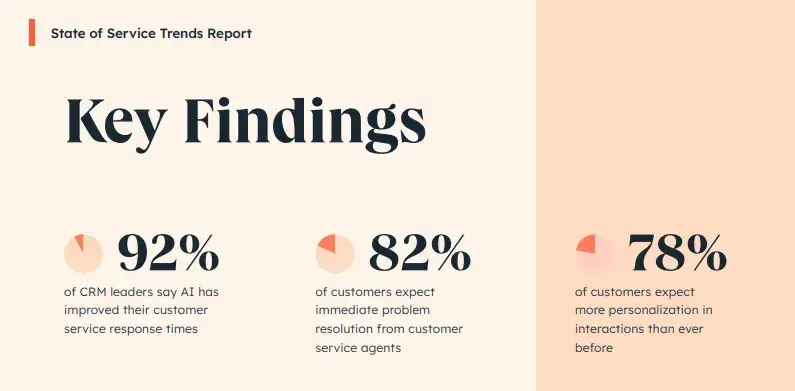
Steve Case, a Financial and Insurance Consultant at Insurance Hero, shared how this works in his field. “I use AI to assist customers in making life and critical illness insurance choices. One of them is AI-powered chatbots that help to answer frequent questions and give an initial quote, depending on the data entered by customers.” These chatbots can scan and compare a range of insurance products within seconds, which lets him deliver tailored advice without delay.
Before adopting the system, Case said preparing quotations meant manually collecting and comparing data from multiple providers. This was a slow, repetitive process. Now, response times have dropped by over 45%, and the time saved is reinvested into offering a more personalized service.
Customers notice the difference. Satisfaction is higher thanks to faster communication and more relevant recommendations, while the AI’s ability to track preferences and trends gives Case actionable insights to further refine the company’s offerings.
Built-in research assistants
AI’s role in customer experience isn’t limited to individual support interactions. It can also serve as a built-in research assistant that helps CX teams work proactively. CX leaders can query an AI system to spot broader patterns, for example, “What was the most common pricing-related question in the last 60 days?” and get an immediate answer.
Natural language processing (NLP) makes this possible by turning open-ended responses into structured insights - something that once required extensive manual effort. Wellhub, for instance, analyzed more than 2,000 open-ended survey responses in just a day and a half by using Survicate.
“Survicate’s AI let us quickly cluster those comments into clear themes, helping us to quickly shape the product experience we aimed to release,” the company shared.
With AI research assistants, CX teams can quickly spot trends, identify recurring pain points, and feed those insights back into product and service improvements, closing the loop faster than before.
Smart email triage for loaded inboxes
For many CX teams, the day starts with a crowded inbox. It takes a lot of time to sort through every message to decide what’s urgent and what can wait. It also delays the responses customers expect. AI-powered email triage automates that first pass, by routing straightforward requests to the right place and flagging complex issues for human review.
Jack Johnson, Operations Director at Rhino Rank, said this has completely changed his daily workflow. He explained that the system scans every incoming client email, puts simple requests into folders, and highlights complex questions for the team to address. “We still review flagged messages, but the AI does the first pass every morning,” he noted.
Before adopting the tool, Johnson often spent over an hour each day just reading, sorting, and guessing what mattered most. Now, urgent issues never get buried, responses go out faster, and routine problems require less back-and-forth. As he put it, “My team focuses on real conversations instead of endless sorting.”
Drafting email responses based on context
Generative AI helps agents reply to customers more quickly without losing the personal touch. In the field, it suggests troubleshooting steps on the spot. In customer service hubs, it drafts email responses based on the customer’s query and history.
For example, if a customer emails about a delayed shipment, the AI can pull the latest tracking details, reference the customer’s order history, and create a ready-to-send reply with an apology and updated delivery estimate. The agent then reviews the draft, makes any necessary adjustments, and sends it, cutting minutes off each response while keeping the message accurate and personal.
The same technology works at scale. Imagine a contact center with 1,000 or even 10,000 agents. If they were to manually review every conversation to understand performance, it would be costly and slow.
AI can analyze transcripts from all calls, identify where agents spend the most time, and classify complaints in detail. Operations leaders can then pinpoint why certain calls take longer, resolve service process gaps, or alert product and marketing teams when changes are needed.
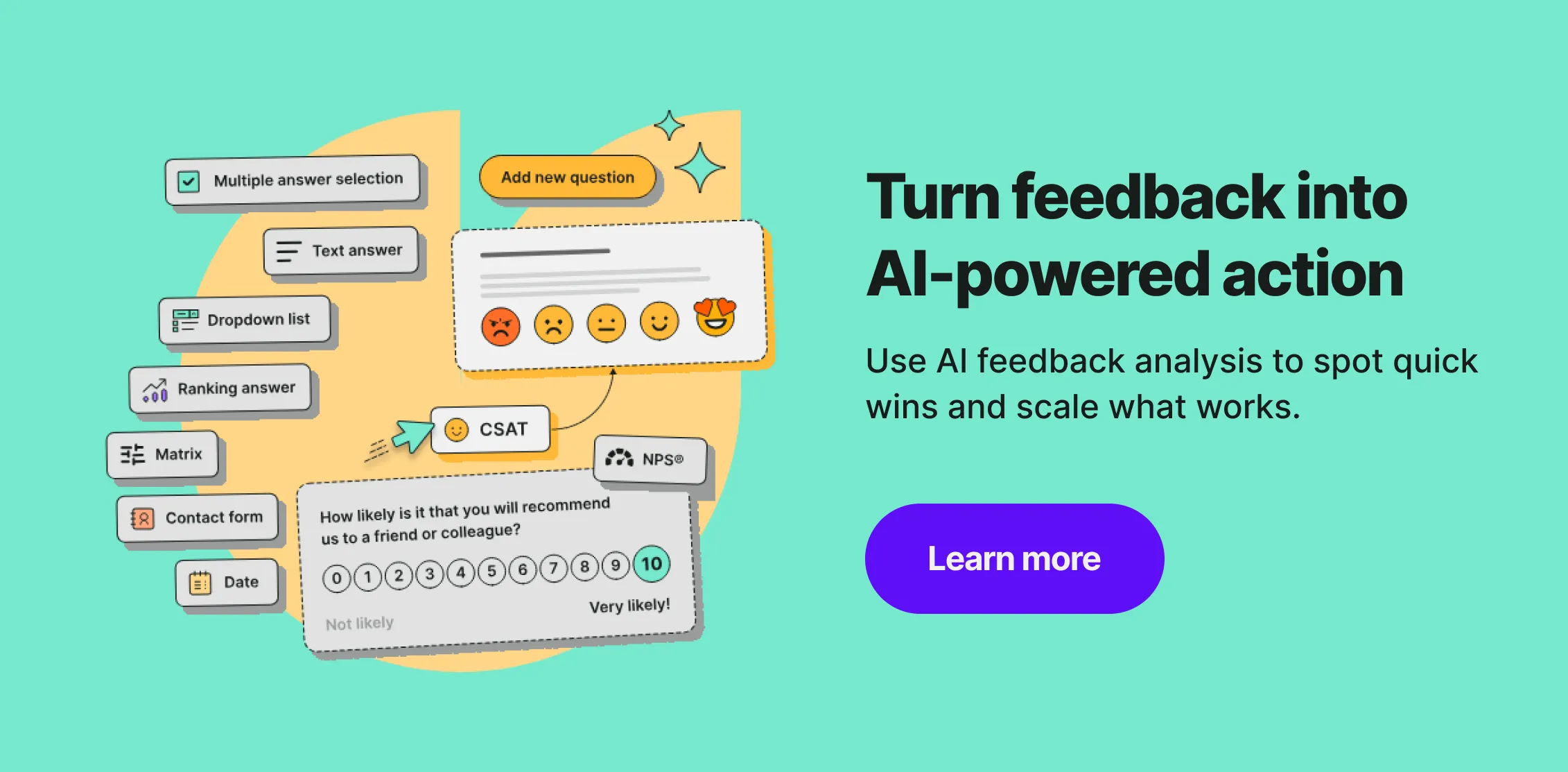
Self-service
Many customers want to solve simple problems themselves. In fact, 61% say they prefer self-service, but only 14% of support issues actually get resolved this way. The gap between what customers want and what current tools deliver is still wide.
Over the years, companies have used virtual agents and chatbots to guide customers down pre-set paths. Traditionally, teams first analyzed what customers were asking, identified intent, and then hand-built dialogue flows to steer them toward a solution. It worked, but it took time, and the experience could feel rigid.
Generative AI changes that. Customer journeys can now be created faster, with richer and more natural conversations that adapt to variations and side questions. The tools that build these flows are also becoming easier to use. A subject matter expert can describe the journey in plain language, and AI will generate the underlying flow automatically. The result is a self-service experience that feels less like talking to a script and more like getting real help.
Product onboarding
Getting onboarding right is critical—not just to guarantee a good customer experience, but primarily to prevent new users from churning. This is especially true for products that are complex, feature-rich, or require some technical know-how.
Madison Kochenderfer, Customer Success Lead at Dock, says AI has made their onboarding process a lot smoother. The team uses it to turn call transcripts into personalized customer success plans automatically. “After a kickoff call, Dock AI scans the transcript for goals, success metrics, key stakeholders, and next steps, then generates a structured success plan directly in the customer’s onboarding portal,” she explains.
What was it like before AI? As it’s easy to imagine, it included hours of rewatching calls, taking notes, and manually updating documents. Now, onboarding plans are ready instantly, and Dock’s team can share them with clients the same day. Kochenderfer adds that this not only gets customers up to speed faster but also frees CSMs to spend more time building relationships during live calls.
Task scheduling
Workforce management is, arguably, a lesser-known AI use case. However, though indirectly, it can significantly improve customer experience with the company.
Caspar Matthews, Director of Electcomm Group Electrical & Data, told us that before AI came to the picture, he would assign jobs manually. This was a process that often caused delays and inefficient use of resources. Over-qualified technicians would be assigned to simple tasks and vice versa. “Today, AI analyzes past assignment data, technician skills, proximity, and job urgency to automatically schedule tasks,” Matthews says.
He says that the system doesn’t replace human judgment but helps reduce errors and speed up operations. Since implementing it, Electcomm has seen a 30% improvement in response times and a 20% increase in customer satisfaction. This shows just how much impact improving operational processes with AI can have on the overall customer experience.
Detecting customer dissatisfaction and preventing negative reviews
One of the biggest game-changers AI has brought to customer interactions is the ability to spot and even prevent customer frustration in real time. But how exactly does this work?
Alex Vasylenko, Founder of Digital Business Card, told us that his team uses AI during live chats to monitor how customers are feeling in real time. “The system picks up on the customer’s tone and words and lets our reps know right away if the customer is getting angry or confused,” he says. This allows the team to react adequately, or even involve a manager before small issues escalate.
Vasylenko notes that without AI, his team would frequently miss these subtle signs of frustration. He believes that it’s simply impossible to detect all of them manually, especially when reps handle multiple chats at once. “Sometimes, we didn’t know a customer was mad until they wrote a bad review,” he adds.
For companies like Vasylenko’s, this isn’t something that can be tolerated—even one bad review can reduce purchase intent by 42%.
Since implementing the system, Digital Business Card has cut follow-ups on complaints in half and increased customer happiness scores by more than 20%. This use case is a great example of where AI can support human judgment, especially in time-sensitive, emotionally-charged situations.
Product and service improvements
AI can help you understand not only what users turn to you with, or how they engage with a product. You can use it to observe how they engage with educational resources on your site.
Olivia Tian, Marketing and Innovation Manager at Raise3D, told us how they use AI in their intern training program. She explained that the company invites engineering students to take part in their STEM career programs. Part of their job is to design and test custom drone parts. Previously, the team reviewed tickets and feedback manually to find improvement ideas—a slow process where it was easy to miss repetitive patterns.
This has now changed. As Tian explained, “AI clusters similar questions, highlights common frustrations, and predicts what a user is likely to search for next.”
For instance, the system recently revealed that many new users were missing a one-time calibration step. To tackle this, the team created a one-page visual quick-start guide. This single change has reduced tickets on that topic by 40%. At Raise3D, humans still remain the ultimate decision-makers. “Technology really feels human when it works with you, not instead of you”, Tian concluded.
"AI makes it easier to see what matters to customers.
Feedback often comes scattered and messy, with different requests pulling teams in all directions. AI can group and highlight recurring themes, so you understand where the majority of customers align. This takes guesswork out of prioritization and ensures decisions reflect customer needs rather than the loudest opinions in the room."
Providing quotes
A use case that sits at the crossroads of sales and CX is using AI to analyze communication from prospective clients to generate personalized quotes.
3ERP’s Founder, Ronan Ye, told us that he has applied this approach to transform how the metalworking shop handles quotes. Previously, each request required an engineer to spend 30–60 minutes checking drawings, tolerances, and materials.
“AI-assisted quoting software now does the first pass in minutes,” Ye explained. The system flags unusual tolerances, estimates machining time, and suggests materials based on previous jobs. He still reviews each quote because AI can’t yet handle complex features like thin walls. Yet, turnaround has dropped from a full day to about an hour.
Faster responses have directly impacted sales. Ye explained: “we lost work before AI, just because a competitor was able to respond faster. Now we’re winning work without compromising quality.” When asked for a key tip, he said that companies should let AI handle repetitive calculations, but keep humans in the loop to ensure accuracy and maintain customer trust.
AI-assisted customer feedback analysis
Because AI has proven its knack for reading sentiment—as we’ve already mentioned for email triaging—it’s natural for CX leaders to put that strength to work in broader customer feedback analysis.
That’s exactly what text-to-speech platform Speaktor is doing, says the company’s COO Berkay Kinaci. Every piece of feedback, whether it comes from a support ticket, an email, or a social media comment, runs through an AI model that tags sentiment, urgency, and recurring themes.
“Instead of reading through hundreds of unstructured messages, our team sees patterns, keyword clusters, and sentiment shifts in real time,” Kinaci explains. With this kind of overview, the CX team can quickly spot the conversations that need a personal touch and tackle them before they escalate.
Ever since Speaktor started using AI this way, response times have gone down by more than 30%. As Kinaci puts it, the AI “speeds up the work without removing the human judgment that makes customer interactions meaningful.”
This is also something you can do using a tool like Insights Hub—either by browsing topic categories yourself or chatting with an AI assistant to find out what the customers most frequently bring up.
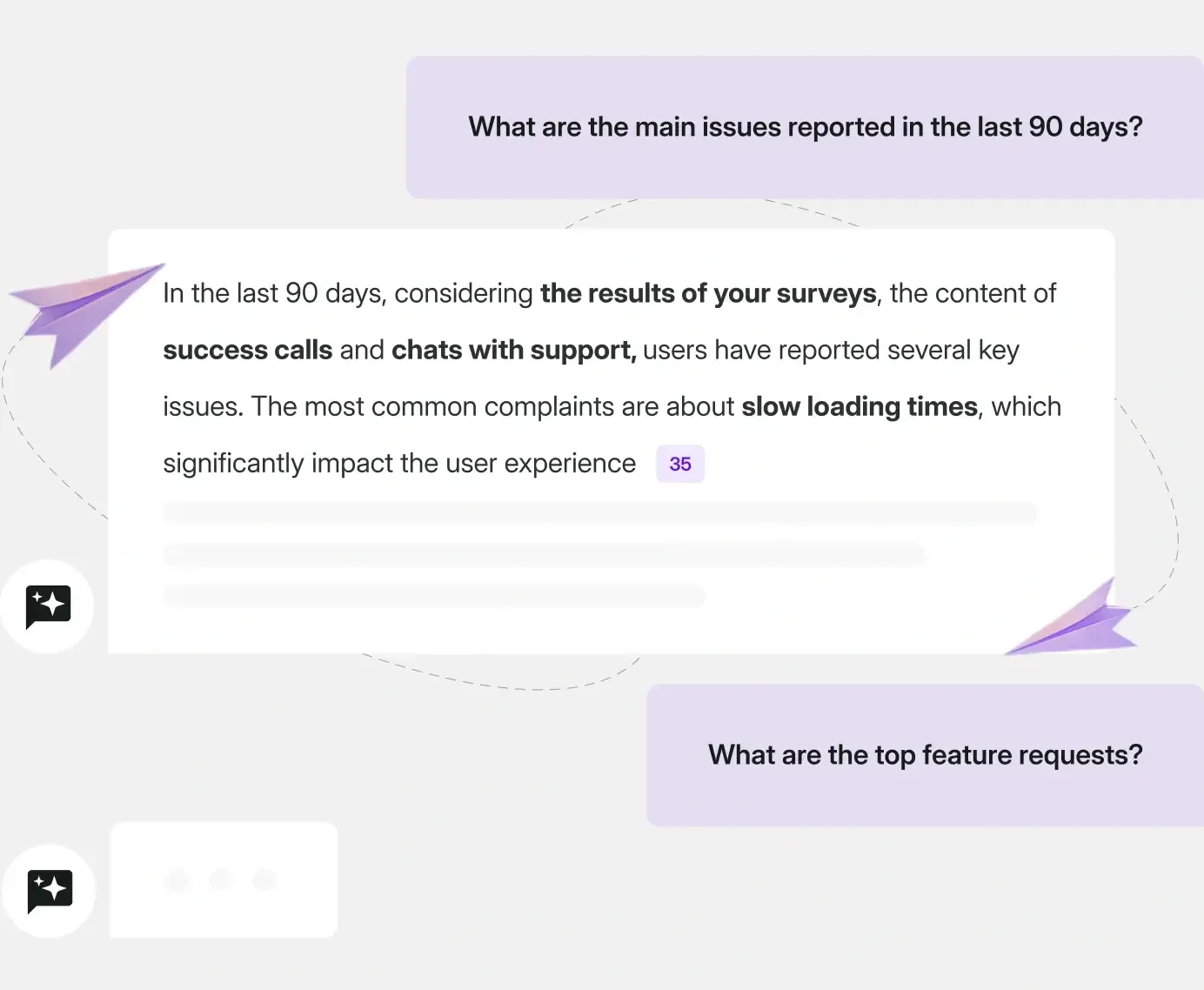
Sadly, some AI projects fail…
But most failures happen for predictable reasons and you can avoid them. Here are the main ones to watch for:
- The problem isn’t clear – if the team can’t agree on exactly what they’re trying to fix, the solution will miss the mark.
- The data isn’t there – AI needs plenty of relevant, high-quality data to work well. Without it, results suffer.
- Shiny object syndrome – chasing the newest tool without thinking about whether it solves a real customer problem. Focus on problem resolution, not the newest tech.
- Weak foundations – without the right systems to store, manage, and deploy data, even the best idea can stall.
- Goals that are too big – some problems are simply beyond what today’s AI can handle. That’s why it’s important to pick the right area for CX automation.
If you start with a clear goal, strong data, solid infrastructure, and realistic expectations, you give your AI project a much better chance to succeed—and to create real value for your customers.

For best results, take your AI implementation one step at a time
Don’t fall into the AI-everything trap. Many companies jumped in and added AI to every process imaginable, hoping it would single-handedly improve company performance.
Yet, this kind of approach often delivers the opposite effect, and it’s not what we ourselves follow at Survicate.
With AI-powered feedback analysis, you’ll quickly see where automation or personalization will have the biggest impact, then measure the results before scaling further.
Ready to get started? Sign up for Survicate and let AI show you the next best step in your customer journey.








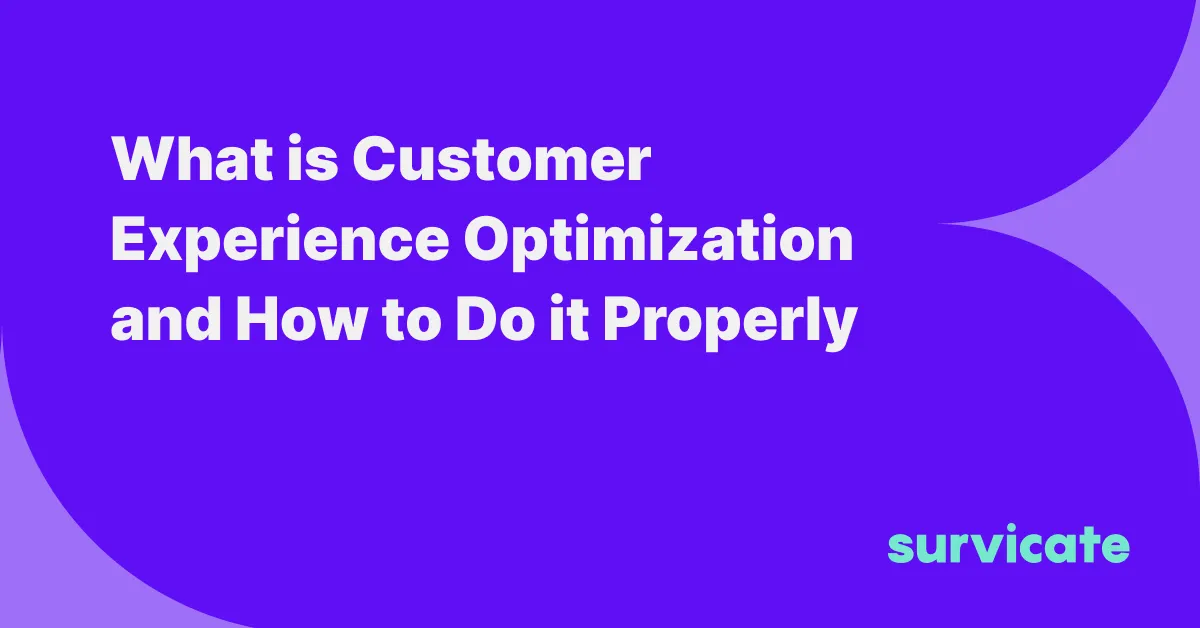
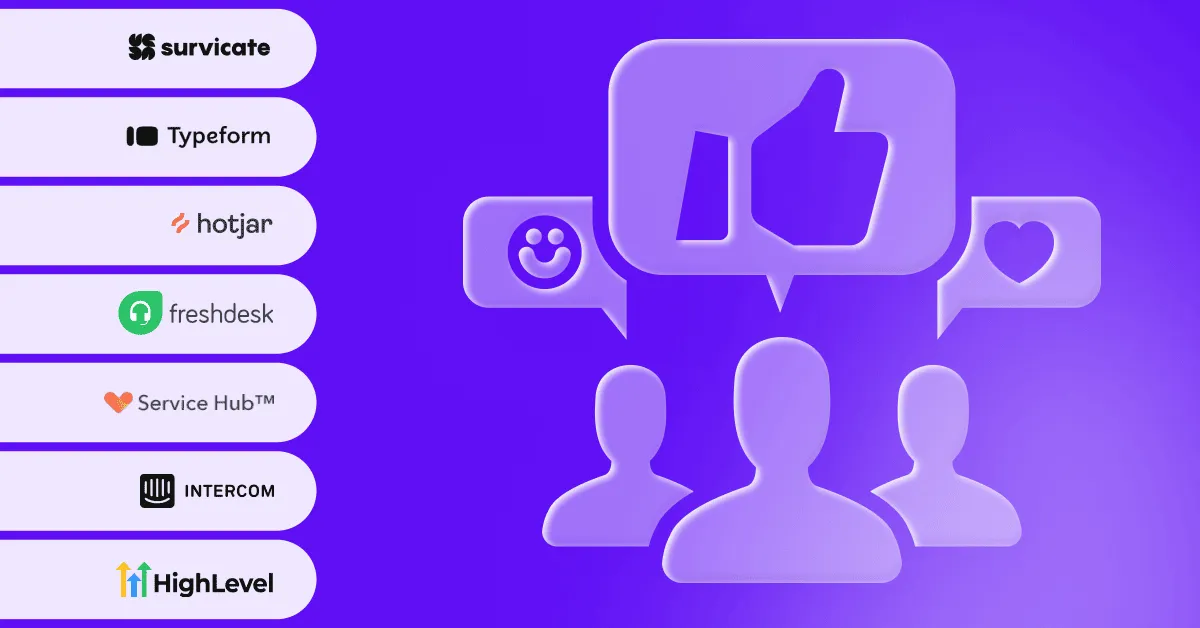
.webp)
.webp)


.svg)

.svg)


